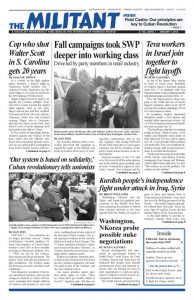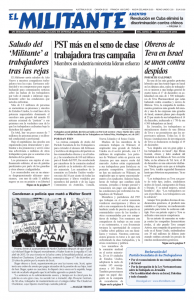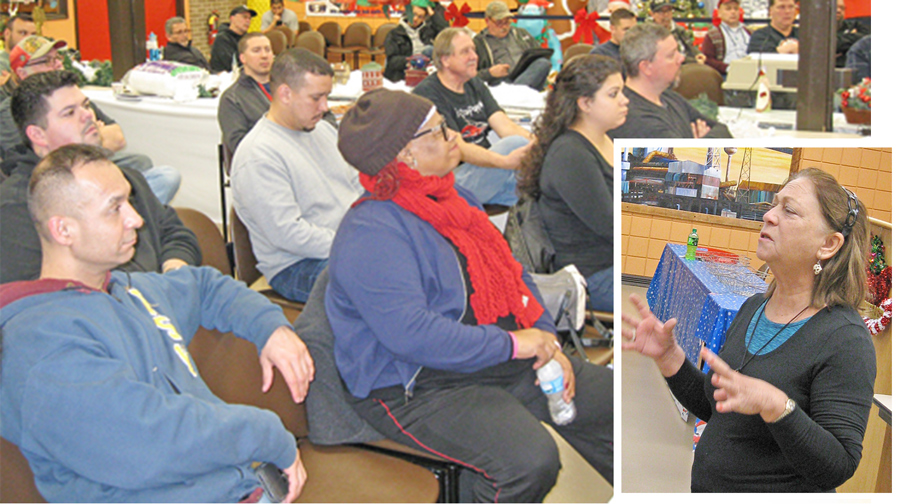CHICAGO — “Our industries are no longer privately owned,” Cuban revolutionary Griselda Aguilera Cabrera told members of United Steelworkers Local 1010 at their monthly meeting in Hammond, Indiana, Dec. 7. “They are run by the workers, their unions and the government. The unions work with the government to plan production. The workers make the decisions on safety and other work conditions.”
Tom Hargrove, president of the local, introduced Aguilera, who was the youngest volunteer in Cuba’s 1961 literacy campaign that taught millions of workers and farmers to read and write, enabling them to take control of the direction of their country. The local organizes workers at the ArcelorMittal steel mill in East Chicago. The 75 union members watched a shortened version of the film “Maestra,” or Teacher, about the mass literacy campaign before Aguilera spoke.
Workers in industry attended classes held in their factories for two hours per day, Aguilera explained. One hour was paid as part of the workday, and one was voluntary labor.
One union member asked Aguilera about wages in Cuba. “They are about $100 per month, which is too low,” Aguilera said, “but they are higher than before the revolution. And you have to remember, we don’t pay for medical care or education. Rent, mortgage payments, and utility rates are low. We are a poor country, impacted by the embargo by the U.S.”
After the meeting, three union members expressed interest in signing up for the 2018 May Day Brigade to Cuba.
Aguilera spoke to hundreds of people at meetings in Milwaukee and Chicago Nov. 29 through Dec. 9, as part of a tour organized by the Chicago Cuba Coalition.
She spoke to two high school classes in Chicago, one at Pedro Albizu Campos High School in the Humboldt Park neighborhood and one at Bogan High on the South Side. Marilen Corres, the teacher who organized the meeting at Bogan, had gone on the annual May Day brigade to Cuba earlier this year. “The students got a chance to hear the truth about Cuba,” she told the Militant.
The Loyola University Department of Sociology and Chicago ALBA Solidarity group sponsored a meeting at the Corboy Law Center in downtown Chicago Dec. 5, titled “Women in Cuba: Our Achievements and Continuing Struggles.”
“We don’t experience sexual harassment like women do in the U.S.,” Aguilera said. “Our system is based on solidarity, and hiring and promotions are based on qualifications not sexual favors.”
“Why is Cuba so different from other countries?” Ananda Badil, a college student, asked her. “In Cuba, women are respected,” Aguilera said. “And we gained confidence through our revolution.”
On Dec. 9 Aguilera joined three doctors and a nurse from Cuba at a public meeting. The medical workers are in Chicago as part of a project organized by the University of Illinois Cancer Center. They have been studying how to address the infant mortality rate in Englewood, an overwhelmingly Black working-class neighborhood, which is more than double that of the city as a whole. More than 50 people attended the meeting, held at a neighborhood community center.
Health care is accessible and free
Dr. José Armando Arronte Villamarin described how the Cuban Revolution changed people’s conditions of life, including health care. In 1959 “we had 8,000 doctors. Half of them left the country after the revolution, and the other half stayed in the cities,” he said. The revolution had to reorganize things so everyone could see a doctor. “Infant mortality was more than 60 per 1,000 live births, sanitary conditions were precarious, and many children died of preventable disease.
“Today we have more than 85,000 doctors,” he said. “There is 100 percent access to health care in rural areas, and infant mortality is 4.3 per 1,000.”
“It was very hard for us to understand the health insurance system here,” Arronte added, to laughter, “because for us health care is accessible and free.”
Both Arronte and Aguilera stressed that these changes were the product of a revolutionary social transformation involving the entire population. The Cuban people, led by Fidel Castro and the July 26 Movement, confronted the legacy of underdevelopment left by colonial and capitalist rule in Cuba. When young volunteers went to the countryside to teach reading and writing in 1961, many peasants they taught had no clean water or modern sanitation.
“Part of the literacy campaign was to introduce education on basic health and hygiene,” Aguilera said, “and to do so in a way not to undermine the self-esteem of the people.”
All of the members of the Cuban medical delegation in Chicago had taken part in internationalist missions to aid working people in other countries.
“There are more Ghanaian doctors in New York than in Ghana,” Dr. Berta Maria Bello Rodríguez said, describing her experiences there. “In many areas the only doctors are Cuban. In Africa we encountered diseases that are no longer a problem in Cuba, such as malaria. We had to go back to the books.”
“It’s hard to get insulin,” Arronte said, describing the impact of Washington’s 50-year-long economic war against the people of Cuba. “We were receiving it from a U.S. company that was based in a third country,” and that supply was suddenly cut off.
“I was privileged to visit Cuba with the May Day brigade,” said Michael Jabari Tidmore, who chaired the event. He urged others to go next year.
“Cuba plays an important role around the world,” he said, adding that part of Washington’s unrelenting campaign against the Cuban Revolution is to make sure “this information is blocked from getting out. This blockade must end.”
Aguilera will be in the U.S. through February. Anyone interested in organizing events for her to speak should contact the Chicago Cuba Coalition at chicagocubacoalition@pobox.com.


